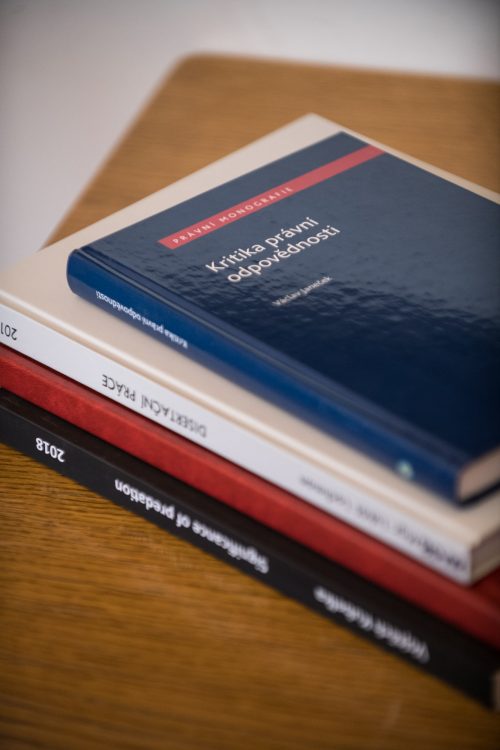Václav Janeček awarded Bolzano Prize for ground-breaking research
10 Apr 2019

On Monday, Václav Janeček (2017, DPhil in Law) received the Bolzano Prize from the Rector of Charles University in Prague, Professor Tomáš Zíma. The Prize is awarded annually for the best research produced by a student at Charles University, judged to be original, interdisciplinary and of scholarly excellence. It is arguably the most prestigious research student award in the Czech Republic; and the publications for which the authors receive the award are regarded as ground-breaking works that have, or promise to have, significant impact within their field. Each year, the Bolzano Prize is awarded in three categories, and Václav received the prize for social sciences and humanities for his book Critique of Legal Responsibility (which you can read more about in an earlier news article here).
Václav is now working on another exciting and highly original project for his DPhil at the University of Oxford, examining how the English law of damages (i.e. the law of monetary remedies awarded by courts in response to wrongdoing) protects and promotes public interests.
Below is a translation of an interview originally published in Czech here.
Václav Janeček: Supporting the revival of the Czech legal culture after 1989
“Imagine a top politician […] picks up a fight against cheap populism and assumes responsibility for healing the society outrageously divided against itself. I know, this scenario is not easy to imagine, but you can try. Now imagine the same politician […] assumes full responsibility in case of their failure. This fantasy already belongs to the world of round squares and similar nonsense.”

These words open a book by Václav Janeček entitled Critique of Legal Responsibility, which was awarded the Bolzano Prize for ground-breaking research in social sciences and humanities. In the spirit of Kantian intellectual tradition, the author critically examines the institute of responsibility at the intersection of law and philosophy and seeks to restore its adequate role in Czech law.
You won the Bolzano Prize for your publication Critique of Legal Responsibility. In what aspects it the book unique?
Perhaps in that it goes its own way and partly against the tide. Some even say that it reads well. (laughs) But I would not overestimate that. I think it was rather a lucky coincidence that I won the Bolzano Prize.
While the concept of responsibility is vital for current law, we also witness the process of ‘de-responsibilisation’. Could you describe this phenomenon?
The thing is that we are often unable or unwilling to explain responsibly why others should let us realise our own plans at their expense. This could concern air pollution at the expense of the current and future generations as well as damage to someone’s property caused by a traffic accident. According to our social contract, we have an emission trading system as well as an insurance market, both of which draw us apart from responsibility. Law thus supports mechanisms that do not leave much room for responsibility.
Given the situation, is it worth aspiring to retain responsibility in law?
Absolutely. All the more in private law which deals with conflicts between individuals. In this regard, it strikes me as odd that the new Czech Civil Code systematically evades the notions of responsibility or liability. Allegedly, this is so because these concepts are intrinsically contradictory, but I say that we need not worry about what responsibility is and whether the term is contradictory. Rather we should worry about why a person should be legally liable to respond. We should worry about the sense of responsibility and about protection and support of a responsible human spirit.
Could our law function without responsibility?
We could prescribe, for instance, that s/he who causes harm to another person has a duty financially to compensate that mischief – which by the way is the basic construction of the present Czech Civil Code. What does it mean? Perhaps that I owe a financial compensation to my neighbour whose vase I accidentally smashed yesterday. Perhaps that I owe money to my friends whom I promised to give a ride, but which promise I did not manage to keep.

So, although one would not be responsible, s/he would have lots of debts?
Exactly. Debts and duties in place of responsibility. Such a vision of law appears very daunting to me. Should we take the current Czech law seriously, we would be compelled to think about our own deeds as if they trigger legal sanctions regardless of whether we acted responsibly or not. Experience suggests, though, that my neighbour and friends will normally forgive me and let go, especially if they understand the reasons of my actions and that I am not irresponsible after all. This is because responsibility does not mean one’s ability to act on the right reasons, but the readiness to give and defend the reasons of one’s actions.
Paradoxically, a system of law in which responsibility plays a central role could result in fewer sanctions and debts as well as in stronger social cohesion. Either we could talk to each other and seek mutual understanding even when facing a personal conflict, or we could simply exchange the numbers of our bank accounts and send each other money whenever we cause some harm. The second model scares me slightly. It scares me because it unteaches us the art of forgiving, for instance, or because it prefers assets over humans.
Why did you choose legal responsibility as your research topic? Why does it deserve attention?
Two issues sparked my curiosity at the beginning of this project. First, why the Czech Civil Code of 2012 abandons the term responsibility. Second, to what extent were we able to part with our totalitarian past and pre-revolutionary models of thinking in relation to basic legal categories. The Civil Code was sometimes presented as a symbol of completion of this socio-legal revival after 1989. So I wanted to test this by looking at legal responsibility, because responsibility has been running through the veins of our law since time immemorial and because it sometimes reaches beyond the law too.
Although our doctrine and theory are not doing badly at all, it turned out that in relation to the issues of civil liability and responsibility, there is a lot to catch up on. I thus wanted to offer a new perspective that will help us find our own sensible conception of this institute and that will reinstate its fully-fledged role in law. At the same time, I wanted to put forward a conception that might be developed and criticised by others and, consequently, that will encourage Czech lawyers to engage in international debates concerning legal responsibility. After all, without our own conception of legal responsibility we could hardly aspire to lobby for a specific model of liability of AI and robotics at the European Union level, for example.
Is there any typically Czech conception of responsibility?
On the one hand, there is a conception which is offered by my book – this one is typically Czech because it is rooted in Czech legal history (the book tells the story of responsibility from the Middle Ages until the present). On the other hand, there is a non-conception which is offered by the new Czech civil law – this one is also typically Czech because it is unusual to avoid responsibility in law. The choice is up to the future generation of lawyers. The book is primarily dedicated to them. It would be wonderful if the Bolzano Prize helped attract more students to this publication.
Václav Janeček is reading for a DPhil in Law at the University of Oxford (St Edmund Hall) where he moved after studying law and philosophy at Charles University and the University of Sussex. His research interests span questions of law, philosophy, and information technologies. Earlier, Václav worked as a researcher at the Oxford Internet Institute (University of Oxford) and the Law Faculty (Charles University). He taught at both universities. Václav was a visiting scholar in Hamburg (MPI), Vienna (ETL), and Fiesole (EUI). He regularly publishes and presents his research nationally and internationally. He has received several prestigious research awards.
The photos in this article were provided by Mr René Volfík (http://fotorepo.cz).
Categories
Other News

